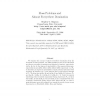4377 search results - page 1 / 876 » Mass problems and randomness |
BSL
2005
13 years 4 months ago
2005
A mass problem is a set of Turing oracles. If P and Q are mass problems, we say that P is weakly reducible to Q if every member of Q Turing computes a member of P. We say that P i...
MLQ
2007
13 years 4 months ago
2007
We examine the concept of almost everywhere domination from the viewpoint of mass problems. Let AED and MLR be the set of reals which are almost everywhere dominating and Martin-L...
FOCS
2006
IEEE
13 years 10 months ago
2006
IEEE
How much can randomness help computation? Motivated by this general question and by volume computation, one of the few instances where randomness provably helps, we analyze a noti...
EUSFLAT
2003
13 years 6 months ago
2003
In this paper we propose a random set framework for learning linguistic models for prediction problems. We show how we can model prediction problems based on learning linguistic p...
BMCBI
2004
13 years 4 months ago
2004
Background: Recent technological advances in mass spectrometry pose challenges in computational mathematics and statistics to process the mass spectral data into predictive models...

